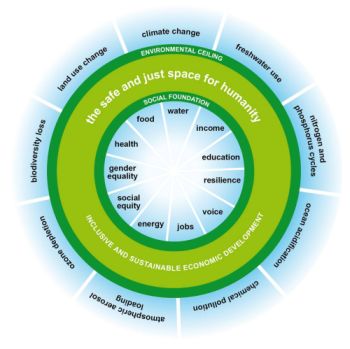By Sabina Zaccaro
RIO DE JANEIRO, Jun 21 (TerraViva) Imagine a space in which humanity can reconcile the often conflicting imperatives of population and a healthy natural environment.
Imagine this space shaped as a doughnut, providing a perspective on sustainable development that pursues environmental sustainability and social justice together.
Kate Raworth from Oxfam Great Britain introduced her novel research during a side event organised by Oxfam and the Expo Milano 2015 at Rio+20.
“Achieving sustainable development for nine billion people has to be high on the list of humanity’s great uncharted journeys,” Raworth told TerraViva.
“If we go over the limits of environmental ceiling there is unacceptable environmental degradation, but if we go under the floor of social boundaries, then we have unacceptable human deprivation. The space in the middle, within the boundaries, is the only just and safe space for all.”
The Expo 2015, scheduled to run three years from now in Milan, Italy, will focus on food and nutrition. Titled “Feeding the planet, energy for life”, the Expo aims at stimulating a global discussion on the challenges linked to food production and food security, safety, availability and nutrition.
“We have to make peace with the earth, and defend it so that all the peoples can have access to its land, water, forests and seeds, and biodiversity,” said renowned Indian environmentalist Vandana Shiva, who was invited by ActionAid, a civil society partner of Expo Milan, to give her views on equity and sustainability.
Rio+20 is a crucial summit for Earth’s future, she said, “But food security must remain on top of the agenda even after Rio.”
Anaclaudia Rossbach, director of the Interecao NGO, a Brazilian partner of the Association of Volunteers in International Service (AVSI) that promotes sustainable development through citizen participation, told TerraViva, “What traditionally happens is that governments take decisions top down and communities have less opportunities to participate, or if there is some space for them, it is always in a consultative way.
“If communities understand what’s possible to build in their territory, then transformations are possible. If they don’t know, if they don’t look abroad, they will be excluded from development forever.”
In July, Expo Milan will announce its financial support for the participation of civil society representatives from 10 developing countries to the upcoming international participants’ meeting Oct. 10-12. The meeting will be held every year until 2015, and convenes all the countries, institutions and organisations that are shaping the Expo 2015.








 Add to Google
Add to Google







